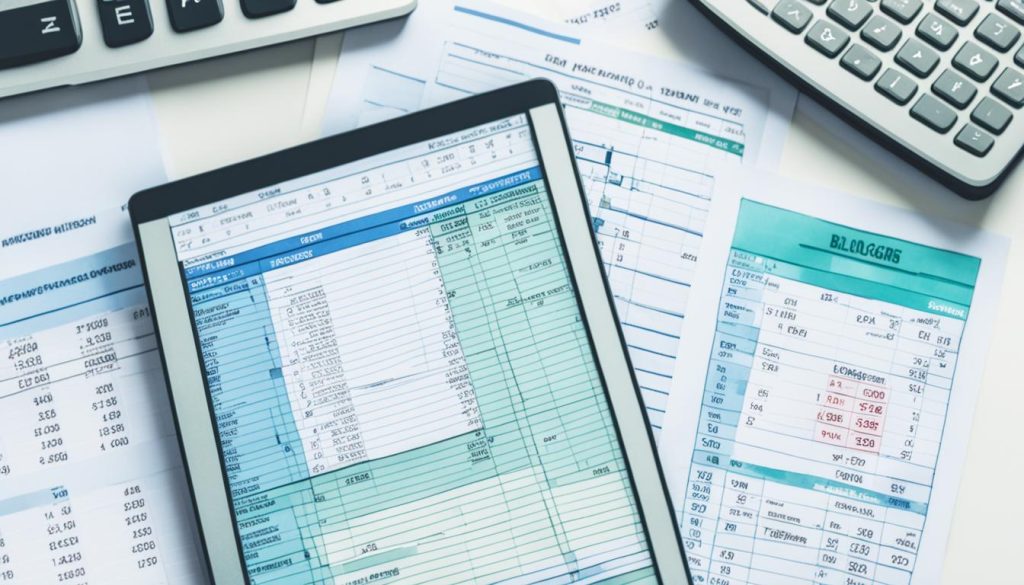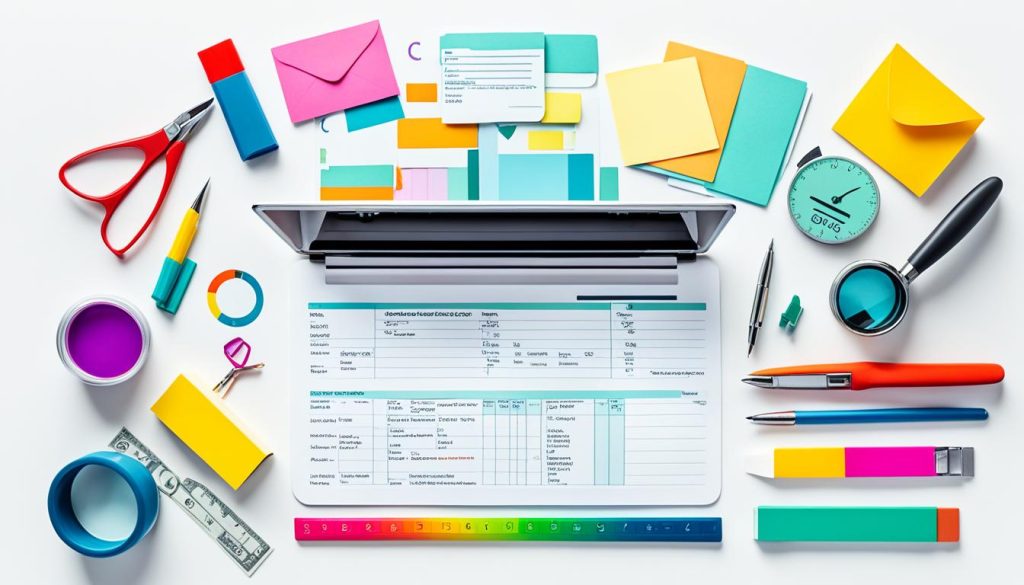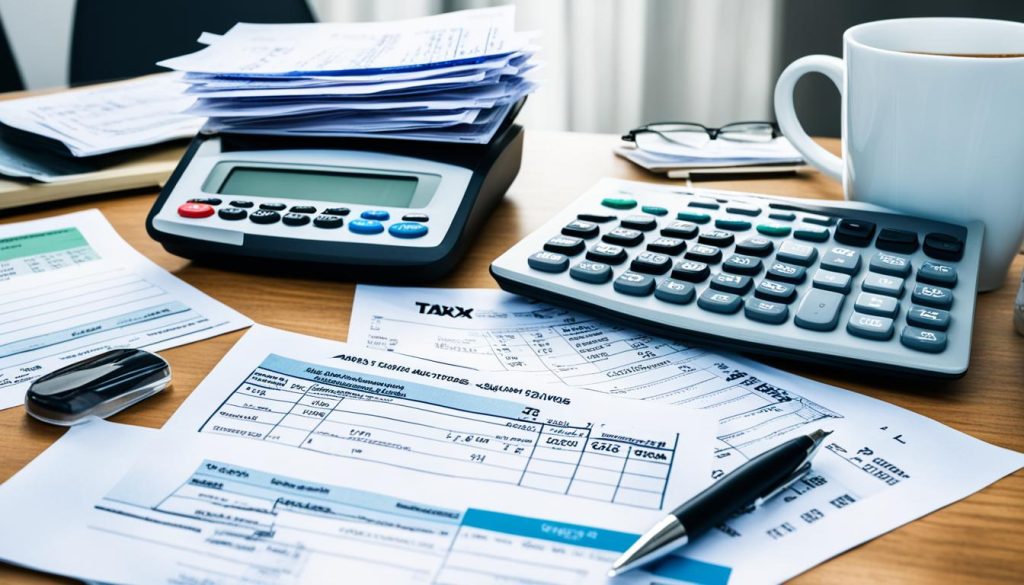More than 50% of bloggers make a living from their blogs. It might look like an easy life, but tax season can be rough. Thankfully, dealing with your blog’s taxes is not as hard as it seems. Ready to find out how to manage taxes for your blog like a pro?
You’ve set up your blog, found your audience, and started making money. But now, it’s tax time. Managing Blogging Income Taxes and Tax Planning for Bloggers are key. We will look at Blogger Tax Deductions, Self-Employment Taxes for Bloggers, and Blogging Business Tax Compliance. These tips will guide you through Blogging Tax Preparation Tips and Handling Taxes as a Professional Blogger smoothly.
Understanding Taxes for Bloggers
Are you a blogger? It might surprise you that your blog’s earning is considered self-employed income by the IRS. Whether your blog is a business or just a side project, you are seen as self-employed. This means you need to deal with two key taxes.
Do I Need to Pay Taxes on My Blog Income?
Yes, any money from your blog means you need to file taxes and pay estimated taxes four times a year. You pay income tax and self-employment tax. Self-employment tax is for Social Security and Medicare.
Different Types of Taxes for Bloggers
As a blogger working for yourself, you must pay income tax and self-employment tax. Self-employment tax looks after Social Security and Medicare.
You get to deduct business expenses from your blog’s income. This lowers the amount you’ll be taxed on, which is good news for you.
Calculating Taxable Blog Income
Figuring out your taxable blog income involves subtracting your business expenses from your blog’s total income. This gives you the “net profit or loss” for your taxes. The IRS has clear rules on self-employment tax calculations.
Defining Your Blog Business Type
Starting a blog means learning about taxes and how to manage them. Different types of bloggers have unique ways to deal with taxes. There are three categories, each with their approach:
Hobby Blogger
Blogging for fun makes you a Hobby Blogger. If you earn money from things like affiliate marketing, you must report it. However, you won’t get as many tax deductions as those with a blogging business.
Side Hustle Blogger
If you blog part-time while working full-time, you’re a Side Hustle Blogger. As your blog makes more money, you must take care of self-employment taxes carefully. You’ll also have to handle quarterly tax payments and filing yearly tax returns.
Full-Time Blogger
Turning your blog into a full-time business brings more tax responsibilities as a Full-Time Blogger. Keeping good financial records is crucial. You should find and use all tax deductions. Plus, think about making your blog a business to improve your tax planning.

If your blog makes money, you’ll need to pay taxes. Knowing how blogging affects your taxes and having a good tax strategy is key. This ensures you’re following the law and making the most from your blogging efforts.
Choosing the Legal Entity for Your Blog
Choosing the right legal entity for your blog is crucial, especially when dealing with income taxes. The size of your blog, how much money it makes, and your future plans all matter. You might pick a sole proprietorship, a partner, an LLC, or a corporation.
If your blog makes money or you plan to earn from it, you must file a tax return. This applies to Tax Planning for Bloggers. As a self-employed blogger, you need to pay a special tax for Social Security and Medicare.
Figuring out your taxable blog income means deducting your business expenses from your income. This includes costs for your domain, hosting, ads, and even some home office expenses. Managing Self-Employment Taxes for Bloggers can get tricky. So, keeping detailed records and maybe getting tax help is wise.
Your blog might be a side job, a growing business, or your main income. Depending on this, your tax and bookkeeping strategy could differ. Following the right Blogging Tax Preparation Tips helps you Handle Taxes as a Professional Blogger. This also lowers your Tax Implications of Blogging Income.
Managing Blogging Income Taxes
Being a blogger means handling your taxes wisely. First, know your duties as someone who works for themselves. You must file taxes each year and make smaller payments every three months. These payments will cover both your income taxes and self-employment taxes.
It’s also key to keep very detailed financial records for tax season. This should include all the money you make, what you spend, and receipts. Being neat and organized makes paying taxes less of a headache and ensures you get all the deductions you can.
To lower the amount you owe, take note of what you can write off. Bloggers can claim many business expenses as deductions, like hosting fees, marketing, tech gear, and some home office costs. Keeping track of these can mean big savings on your tax bill.
Remember to pay estimated taxes every quarter. This approach keeps you from getting a penalty for not paying enough. To figure out these payments, estimate your total tax due for the year and divide it by four.
As your blog business grows, getting help from a tax professional might be a smart move. A CPA or tax expert can guide you, ensure you’re following the rules, find all deductions you qualify for, and help map out a tax plan designed for your needs.

Keeping Thorough Financial Records
As a blogger, it’s vital to keep good financial records for handling blogging income taxes. This means carefully tracking your blogging income and business expenses. It also includes keeping all receipts and important documents. Good records will make tax filing simpler. They help you not miss out on tax deductions or get penalties for missing information.
Importance of Maintaining Records
Having accurate records is key for tax planning for bloggers. These records are your main proof for blogging income tax strategies. They help you find possible blogger tax deductions. Keeping organized helps catch mistakes early. This means you can avoid self-employment taxes for bloggers and reduce blogging business tax compliance issues.
Types of Records to Keep
For bloggers, it’s important to keep certain records like:
- Income records like invoices, receipts, and bank statements
- Expense records including business purchase receipts, mileage logs, and utility bills
- Contracts and agreements you have with advertisers or sponsors
- Accounting records such as profit and loss statements
- Tax-related documents like estimated tax payments
- W-2s, and 1099 forms
Keeping these detailed records will help you with tax implications of blogging income. It ensures you meet all the important blogging tax preparation tips.
Maximizing Tax Deductions for Bloggers
Bloggers have a chance to lower their tax bill and save money. By knowing which tax deductions you can claim, you’ll manage your blogging income taxes well. This leads to more tax savings for you.
Common Tax Deductions for Bloggers
Bloggers can typically deduct costs like:
- Domain and hosting expenses
- Advertising and marketing costs
- Office supplies and equipment
- Technology expenses (e.g., software, web tools, devices)
- Part of home office expenses
- Business travel and mileage
- Professional development and education
- Subscription fees for industry publications or tools
Tracking Business Expenses
To claim all possible deductions, keep detailed records of blogging business expenses. Record all invoices, recepits, and other cost-related paperwork.
Being organized helps at tax time. It ensures you get all the deductions you’re eligible for. This way, you can reduce your tax liability and stay on top of blogging income and cash flow.

Understanding Estimated Taxes
If you’re a self-employed blogger, you need to pay estimated taxes throughout the year. Don’t wait until year-end to pay all your taxes. These payments are for your income tax and self-employment tax. They are due every quarter on certain dates. This way, you pay as you go, rather than facing a big bill all at once.
What Are Estimated Taxes?
Estimated taxes are payments you make to the IRS during the year. They’re an estimate based on what you think you’ll earn, spend, and owe. For self-employed people like bloggers, these payments are due on April 15th, June 15th, September 15th, and January 15th of the next year.
Calculating Estimated Tax Payments
To figure out what you owe, estimate your year’s total tax and divide it by four. This includes income tax and self-employment tax for Social Security and Medicare. The IRS offers tools to help find the right payment amounts based on your blogging income and costs. It’s important to pay these on time to prevent fines and meet your yearly tax duties.
For bloggers, keeping up with these payments is key. It helps you handle your money better and avoid a large tax bill later on. By paying your taxes every quarter, you make your financial life smoother. This way, you keep clear of any extra costs and stay in control of your blogging finances.
Best Tools for Managing Blog Taxes
Being a blogger means keeping track of taxes, which can seem hard. Luckily, many tools and software are here to help. They can make managing your blogging income taxes and blogging tax preparation tips much easier.
Accounting software such as QuickBooks or FreshBooks is a great start. It can handle important tax tasks for you. With these, you can keep up with your blogging income tax strategies and control your blogger tax deductions. Also, they help by creating clear financial reports for filing.
For tax planning for bloggers, consider TurboTax or H&R Block. They are very helpful. They walk you through filing step by step. This way, you won’t miss any tax breaks that could lower your self-employment taxes for bloggers.
There are also apps and tools made just for handling taxes as a professional blogger. They come with cool features. Expect things like keeping track of expenses or reminding you about quarterly taxes. They may even work with your bank to sort out your blogging business tax compliance automatically.
By using these tools and software, staying updated and organized with tax implications of blogging income is way easier. This means more time to focus on the business of blogging itself. Whether you’re wondering about can blogging make you rich, struggling to make ends meet, or dreaming of a life of luxury, they fit all situations.

Filing Tax Returns for Bloggers
If you’re a blog owner working for yourself, handling your taxes is key. This means making quarterly tax payments and submitting a yearly tax return. It’s important to keep things in order and meet all deadlines. By doing this, you’re making sure you don’t run into trouble with the IRS’s rules for bloggers.
Quarterly Tax Filing Deadlines
Every blogger should make quarterly estimated tax contributions. These are due on April 15th, June 15th, September 15th, and January 15th each year. These payments go towards your self-employment taxes and income taxes. They also help with Social Security, Medicare, and your overall tax bill. Doing this will prevent you from facing a big tax bill all at once.
Annual Tax Return Filing
Besides these quarterly payments, you must also submit a yearly tax return by April 15th. On this return, you list all your blogging earnings for the year. This includes business expenses you can deduct. Keeping detailed financial records is crucial. It ensures you can file accurately and apply all the deductions that can lower how much tax you owe.

Tax Planning Strategies for Bloggers
As a blogger, you can cut down your taxes and earn more by planning ahead. A smart move is to make your blog an official business. You have options like sole proprietorship, LLC, or a corporation. These choices not only protect you, but they also let you claim important tax deductions.
Timing is everything when it comes to your money and what you spend. Pick wisely when to count your earnings and costs. This way, you can lower what you owe and delay paying taxes. Think about pushing some income to later or paying for expenses sooner if you had a good year financially.
For bloggers working for themselves, getting every tax break possible is a must. You can deduct a lot, from website costs to your office supplies and some of your home office expenses. Keeping great records all year helps ensure you get these deductions when you file your taxes.
Don’t forget about tax-favored savings for your retirement or health either. Look into a solo 401(k) or health savings account (HSA). These accounts offer tax advantages and let you save for the future as a blogger.
Speaking with a tax expert can really help you map out your tax plan for your blog. They can guide you through the tricky tax rules, find more ways to save, and make sure you’re following the law.
Handling IRS Audits and Penalties
Even the most diligent self-employed bloggers can face an IRS audit or penalties. It’s key to keep accurate records and file your taxes on time. Paying estimated taxes also reduces these risks.
If you’re being audited, fully cooperate with the IRS and show them everything they ask for. It can be wise to get help from a professional in dealing with audits or penalties.
Self-employed bloggers should pay estimated taxes four times a year if they owe over $1,000. These payments are due on April 15, June 15, September 15, and January 15. Not paying on time can lead to extra penalties.
Besides paying taxes, bloggers need to consider what the IRS counts as a business. If a blogger doesn’t make a profit in at least three of five years, their blog might be seen as a hobby. That could limit tax deductions.
To keep tax deductions, a blogger has to prove to the IRS that their blog is a real business. They must show a profit in at least three of the past five years.
Being organized and filing taxes on time can make dealing with the IRS easier for bloggers. It’s also good to potentially get help from a tax professional. This approach can help you avoid mistakes and keep up with tax rules.
Seeking Professional Tax Assistance
Handling your blogging taxes alone is doable, but getting expert help is smart. As your blog becomes bigger, so do your tax issues. A CPA or enrolled agent will guide you. They make sure you follow the tax rules, find all deductions, and give advice just for you.
If you’re a blogger making money on your own, you need to send taxes to the IRS four times a year. A tax expert will check your payments are right and help with self-employment tax confusion.
At times, the IRS might see your blog as just a hobby. A tax professional can help you show it’s a real business. Then you can claim all the deductions you deserve. This could lower the taxes you pay and help your blog make more money.

